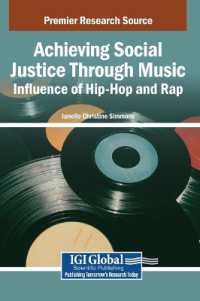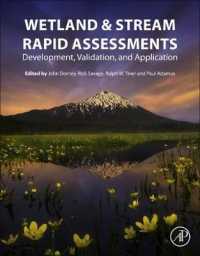- ホーム
- > 洋書
- > 英文書
- > Psychology
Full Description
This edited volume summarizes promising, evidence‑based strategies clinicians can implement in their work with morally injured persons.
Many service members transitioning to civilian life struggle with mental health issues. For some, these mental health issues revolve around moral injury- acts or experiences that contradict the individual amp rsquo s fundamental beliefs about the world, or how it ought to be. The book amp rsquo s expert contributors are researchers and clinicians who are leading efforts to define and assess moral injury, identify its potential mechanisms and outcomes, and develop and disseminate treatments to promote recovery and healing from morally injurious events.
Through the use of case examples, authors discuss promising theoretical models for conceptualizing moral injury, prominent conceptual and clinical concerns for addressing such injuries in clinical practice, and existing and novel intervention approaches.
Contents
Contributors
Introduction to Moral Injury
. A Cognitive-Behavioral Model of Moral Injury
2. A Social-Functional Perspective on Morality and Moral Injury
3. Religious and Spiritual Issues in Moral Injury
4. Forgiveness as a Mechanism of Repair Following Military-Related Moral Injury
5. Case Conceptualization for Moral Injury
. Clinician Issues in Treating Moral Injury
7. Moral Injury, PTSD, and Prolonged Exposure
8. Cognitive Processing Therapy for Moral Injury
9. Acceptance and Commitment Therapy: Using Mindfulness and Values in the Treatment of Moral Injury
. Adaptive Disclosure: A Novel Evidence-Based Treatment for Moral Injury
. Impact of Killing: A Treatment Program for Military Veterans With Moral Injury
2. Building Spiritual Strength: A Group Treatment for PTSD, Moral Injury, and Spiritual Distress
3. Collaboration With Chaplaincy and Ministry Professionals in Addressing Moral Injury
4. Future Directions for Addressing Moral Injury in Clinical Practice: Concluding Comments
Index
About the Editors








